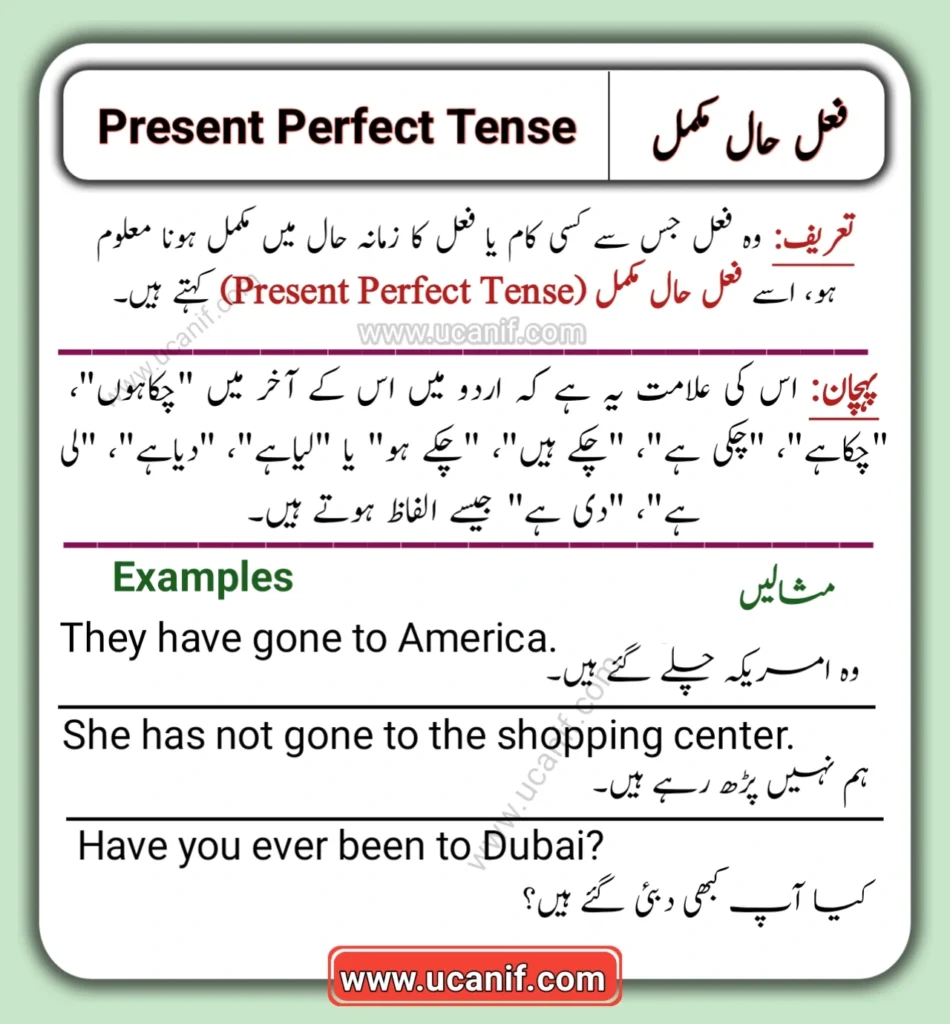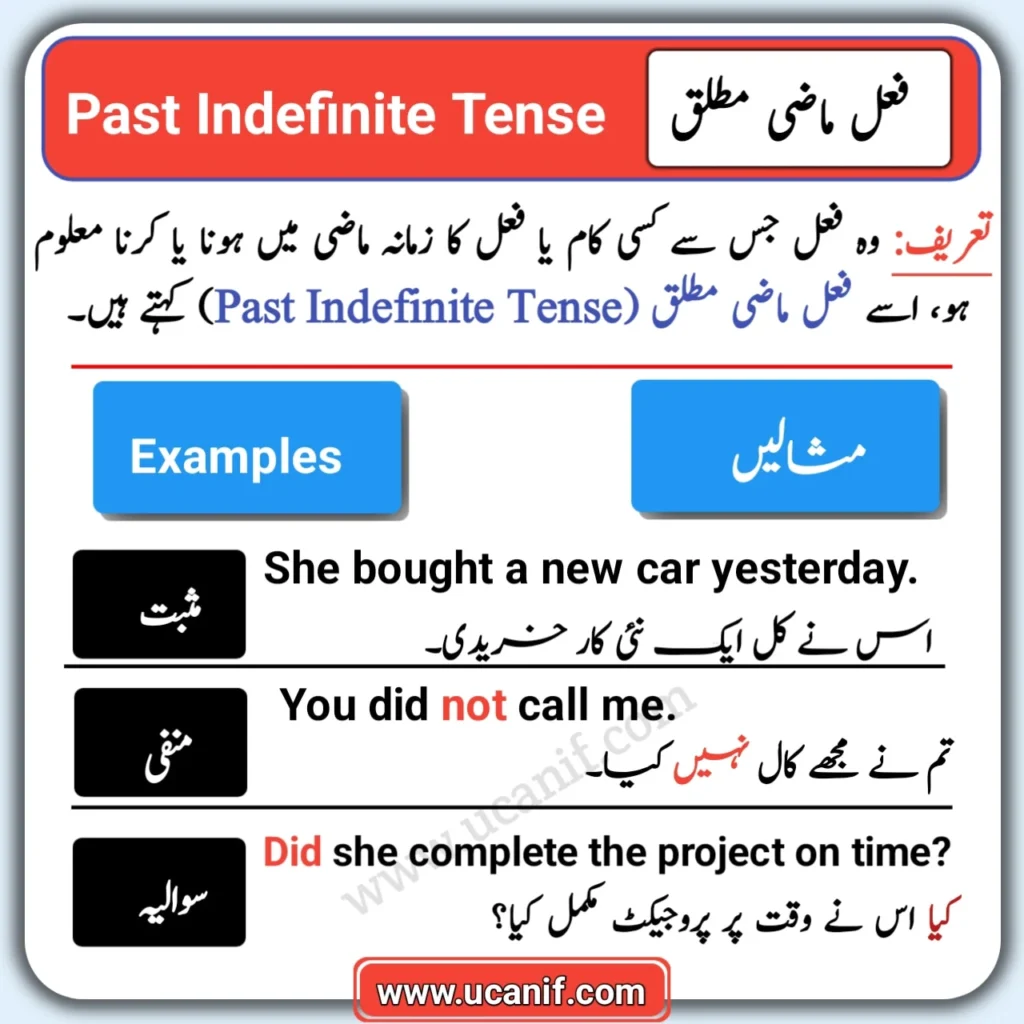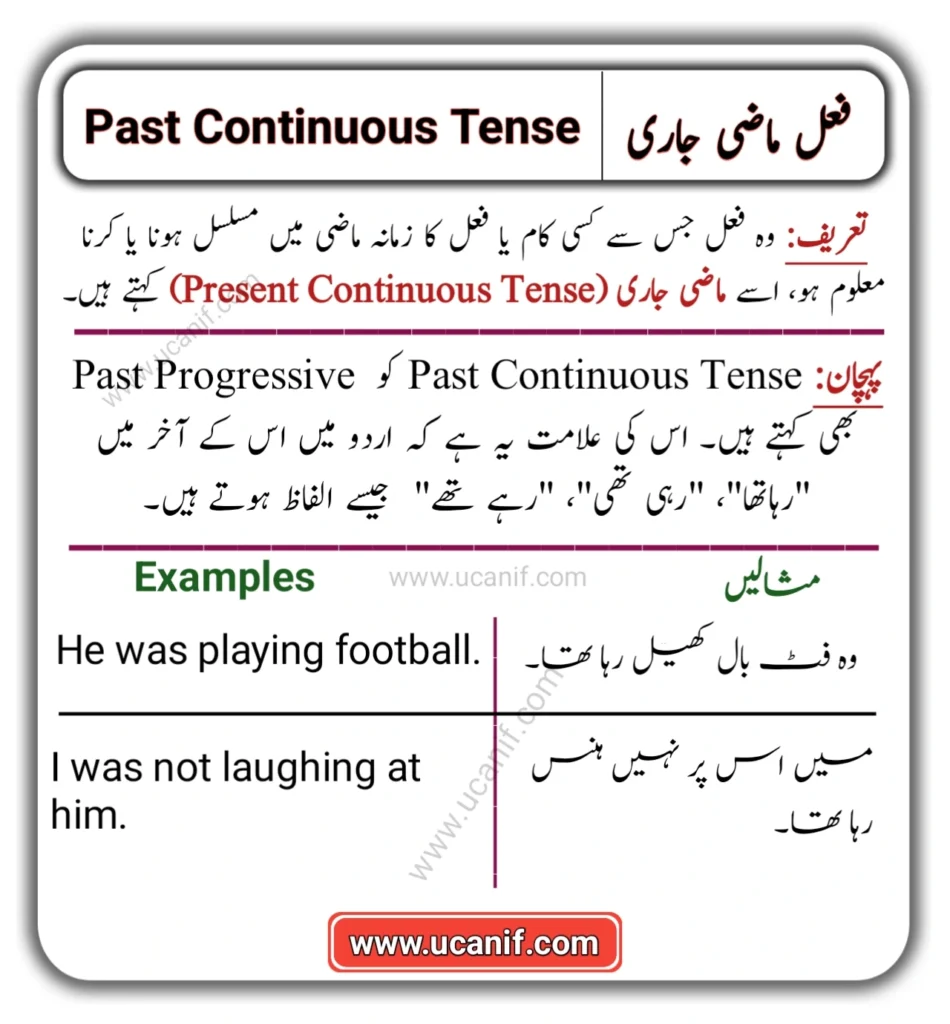Present Perfect Continuous Tense in Urdu and English with 40 Examples
- Definition of Present Perfect Continuous Tense in Urdu
- (فعل حال مکمل جاری کی تعریف)
- Rules Of Present Perfect Continuous Tense in Urdu
- (فعل حال مکمل جاری کی قواعد)
- Present Perfect Continuous Tense examples in Urdu
- (فعل حال مکمل جاری کی مثالیں)
- فعل حال مکمل جاری (Present Perfect Continuous Tense) میں Has been اور Have been کا استعمال ہوتا ہے جو جملہ بنانے کے طریقے میں سمجھ جائیں گے۔
- فعل حال مکمل جاری (Present Perfect Continuous Tense) میں فعل کی first form کے آخر میں “ing” بڑھا کر استعمال ہوتا ہے جیسے: ask سے asking (آسکنگ) اور help سے helping(ہیلپنگ) وغیرہ۔ اسی کو فعل کی ing form اور Forth form of verb (فعل کی چوتھی شکل) بھی کہتے ہیں۔
جملہ بنانے کا طریقہ
- Affirmative (مثبت)
- Negative (منفی)
- Interrogative (سوالیہ)
- Negative Interrogative (منفی سوالیہ)
Present Perfect Continuous Tense in Urdu: Affirmative (مثبت)
- Structure ( ترکیب):
- Subject(فاعل) + Has been/have been+ verb-ing (فعل) +object(مفعول)+ since/for+time
| English | Urdu |
|---|---|
| The chef has been cooking delicious meals. | شیف لذیذ کھانے پکاریے ہیں۔ |
| She has been living in this city for ten years. | وہ دس سال سے اس شہر میں رہ رہی ہے۔ |
| He has been playing the guitar since he was a child. | وہ بچپن سے گٹار بجا رہا ہے۔ |
| He has been working hard all day. | وہ پورے دن محنت سے کام کررہا ہے۔ |
| She has been studying for her exams. | وہ اپنے امتحانوں کی تیاری کر رہی ہے۔ |
| English | Urdu |
|---|---|
| They have been renovating their house for a year. | وہ ایک سال سے اپنے گھر کی تعمیر کر رہے ہیں۔ |
| The children have been playing outside since morning. | بچے صبح سے باہر کھیل رہے ہیں۔ |
| You have been working on the project for weeks. | آپ ہفتوں سے پروجیکٹ پر کام کر رہے ہیں۔ |
| We have been waiting for the rain to stop. | ہم بارش رکنے کا انتظار کر رہے ہیں۔ |
| I have been studying for the exam all night. | میں ساری رات امتحان کے لیے پڑھتا رہا ہوں۔ |
Present Perfect Continuous Tense in Urdu: Negative (منفی)
① فعل حال مکمل جاری (Present Perfect Continuous Tense) کے منفی جملوں میں فعل، فاعل اور مفعول کی ترتیب کے لیے ایک ترکیب (Structure) یاد رکھیں!
- Structure ( ترکیب):
- Subject(فاعل) + Has not been/have not been+ verb-ing (فعل) +object(مفعول)+ since/for+time
| Affirmative (مثبت) | Negative (منفی) |
|---|---|
| I have been learning English For 2 years. | I have not been learning English For 2 years. |
| میں دو سال سے انگریزی سیکھ رہاہوں۔ | میں دو سال سے انگریزی نہیں سیکھ رہاہوں۔ |
② اگر ہمارا Subject (فاعل) Third-person singular (واحد غائب) یعنی He, She, It ہو, یا Singular noun (واحد اسم) ہو؛ تو ہم has اور been کے بیچ میں لفظ not بڑھا دیں گے۔
Examples of negative sentences of the Present Perfect Continuous Tense in Urdu to English.
| English | Urdu |
|---|---|
| He has not been sleeping well due to stress. | وہ تناؤ کی بنا پر اچھی طرح سو نہیں رہا ہے۔ |
| The chef has not been cooking well lately. | شیف فی الحال اچھی طرح کھانا نہیں بنا رہا ہے۔ |
| The car has not been running smoothly this week. | گاڑی اس ہفتے بہترین طریقے سے نہیں چل رہی ہے۔ |
| He has not been practicing the piano for a while. | وہ کچھ دنوں سے پیانو کی مشق نہیں کر رہا ہے۔ |
| She has not been working late recently. | وہ حال ہی میں دیر رات تک کام نہیں کر رہی ہے۔ |
③ اگر Subject ان کے علاؤہ ہو یعنی I, We, You, They یا Plural noun (جمع اسم) تو تو ہم have اور been کے بیچ میں لفظ not بڑھا دیں گے۔
| English | Urdu |
|---|---|
| We have not been waiting for the bus for too long. | ہم زیادہ وقت سے بس کا انتظار نہیں کر رہے ہیں۔ |
| The children have not been playing outside this week. | بچے اس ہفتے باہر کھیل نہیں رہے ہیں۔ |
| I have not been learning French for a while. | میں کچھ دنوں سے فرانسیسی نہیں سیکھ رہا ہوں۔ |
| They have not been working on the project for a long time. | وہ لوگ بہت وقت سے منصوبے پر کام نہیں کر رہے ہیں۔ |
| We have not been studying much lately. | ہم حال میں زیادہ مطالعہ نہیں کر رہے ہیں۔ |
Present Perfect Continuous Tense in Urdu: Interrogative (سوالیہ)
Present Perfect Continuous Tense کے سوالیہ جملے بنانے کیلیے بس ایک چیز کی ضرورت ہے subject اور helping verb کی جگہ بدلنے کی یعنی پہلے Helping verb لائیں گے اس کے بعد subject۔ اور بس جملہ تیار ہوجائے گا۔ جیسے:
| Affirmative (مثبت) | Interrogative (سوالیہ) |
|---|---|
| He has been playing football since morning. | Has he been playing football since morning? |
| وہ صبح سے فٹبال کھیل رہا ہے۔ | کیا وہ صبح سے فٹبال کھیل رہاہے؟ |
② اگر ہمارا Subject (فاعل) Third-person singular (واحد غائب) یعنی He, She, It ہو, یا Singular noun (واحد اسم) ہو؛ تو Subject (فاعل) سے پہلے has اور اس کے بعد been لائیں گے۔
Examples of interrogative sentences of the Present Perfect Continuous Tense in Urdu to English.
| English | Urdu |
|---|---|
| Has Zaid been learning Spanish for a while? | کیا زید کچھ دنوں سے اسپینی سیکھ رہا ہے؟ |
| Has the chef been cooking new recipes lately? | کیا شیف اخیر میں نئے پکوان پکا رہا ہے؟ |
| Has it been raining heavily in your area? | کیا آپ کے علاقے میں زیادہ بارش ہو رہی ہے؟ |
| Has he been practicing the piano all afternoon? | کیا وہ پورے دن پیانو کی مشق کر رہا ہے؟ |
| Has she been working on the project recently? | کیا وہ حال ہی میں منصوبے پر کام کر رہی ہے؟ |
③ اگر Subject (فاعل) I, We, You, They یا Plural noun (جمع اسم) ہو، تو Subject (فاعل) سے پہلے have اور اس کے بعد been لائیں گے۔
| English | Urdu |
|---|---|
| Have you been gardening this summer? | کیا آپ اس موسم گرما میں باغبانی کر رہے ہیں؟ |
| Have we been waiting for the bus for a long time? | کیا ہم بس کا بہت وقت سے انتظار کر رہے ہیں؟ |
| Have the kids been playing in the park all afternoon? | کیا بچے پارک میں پورے دن کھیل رہے ہیں؟ |
| Have they been working on the assignment all night? | کیا وہ رات بھر اسائنمنٹ پر کام کر رہے ہیں؟ |
| Have we been studying effectively for the exam? | کیا ہم امتحان کے لیے مؤثر طریقے پر پڑھ رہے ہیں؟ |
یہ تو YesNo والے سوالیہ جملے ہوئے؛ لیکن اگر WH Family والے سوالیہ جملے بنانا ہو؛ تو YESNO والے سوالیہ جملوں ہی کے شروع میں WH Word بڑھا دیں گے۔ جیسے:
| YESNO Question | WH Question |
|---|---|
| Has he been playing football since morning? | Why has he been playing football since morning? |
| کیا وہ صبح سے فٹبال کھیل رہا ہے؟ | وہ صبح سے فٹبال کیوں کھیل رہا ہے؟ |
| English | Urdu |
|---|---|
| How many hours has he been working every day? | روزانہ وہ کتنے گھنٹے کام کر رہا ہے؟ |
| Where has she been working? | کون آپ کے مطالعے میں آپ کی مدد کر رہا ہے؟ |
| Where has he been traveling recently? | وہ حال میں کہاں کا سفر کر رہا ہے؟ |
| How long has it been raining outside? | باہر کتنی دیر سے بارش ہو رہی ہے؟ |
| What has she been doing all morning? | وہ صبح سے کیا کر رہی ہے؟ |
| English | Urdu |
|---|---|
| What have they been discussing in their meetings? | وہ اپنی ملاقاتوں میں کیا بات کر رہے ہیں؟ |
| When have you been practicing your new hobby? | آپ اپنی نئی دلچسپی کی مشق کب سے کر رہے ہیں؟ |
| How many hours have they been working each day? | وہ ہر روز کتنے گھنٹے کام کر رہے ہیں؟ |
| What have we been studying for the past few weeks? | ہم پچھلے چند ہفتوں سے کیا مطالعہ کر رہے ہیں؟ |
| Where have they been traveling all summer? | وہ سارے موسم میں کہاں سفر کر رہے ہیں؟ |
The Other Present Tenses in Urdu
| The 4 Future Tenses | Example |
|---|---|
| Present Indefinite tense | I go |
| Present progressive tense | I am going |
| Present perfect tense | I have gone |
| Present perfect progressive tense | I have been going |
آج ہم نے Present Perfect Continuous Tense کے جملوں کو بنانا سیکھا۔ اور مثبت، منفی وغیرہ جملہ بنانے کا طریقہ جانا۔ امید ہے آپ سب سمجھ گئے ہوں گے۔ لیکن اگر کچھ نہ سمجھنے میں دشواری ہو؛ تو آپ Comment کرکے ضرور پوچھ لیں۔
Understanding the Present Perfect Continuous Tense in Urdu enables a more comprehensive linguistic grasp. Mastery of the Present Perfect Continuous Tense in Urdu empowers individuals to articulate ongoing actions or events proficiently.
Engagement with the Present Perfect Continuous Tense in Urdu refines language expression.






I like your page very much. If there is a Facebook page or WhatsApp, please give the link. Thank you very much.
Very very nice excellent
I love your page
Thank you ❤️
Thank you ❤️
Facebook Page:
Learn English by ucanif